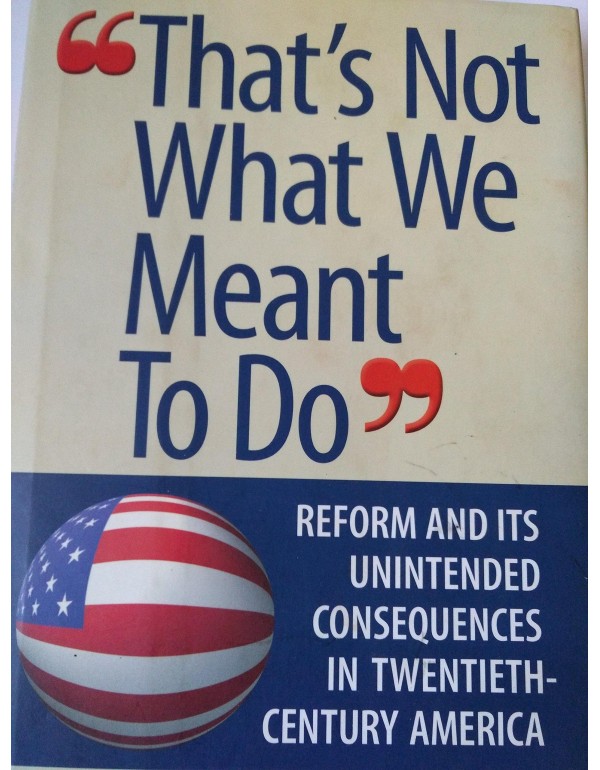Tags: 9780393048841, W W Norton & Co Inc, Gillon, Steven M., Hardcover
That's Not What We Meant to Do: Reform and Its Unintended Consequences in the Twentieth Century
Price: $10.26
Shipping & Tax will be calculated at Checkout.
Estimated delivery time 7-14 days.
International delivery time 2 to 4 weeks.
Estimated delivery time 7-14 days.
International delivery time 2 to 4 weeks.
Amazon.com ReviewHistorian Steven M. Gillon, host of the History Channel's HistoryCenter program, examines how the law of unintended consequences has left its mark on the politics of welfare, mental health, affirmative action, immigration, and campaign finance. On immigration, for example, Gillon describes how a 1965 law to revise admissions procedures wound up opening the floodgates. Senator Ted Kennedy promised the law "will not inundate America with immigrants from any one country or area, or the most overpopulated and economically deprived nations of Africa and Asia." Yet that's pretty close to what actually happened. The huge numbers of immigrants entering the United States today--close to a million legal newcomers annually, and most of them from Asia or Latin America--are a direct result of this reform. And there are many other such examples of good intentions gone awry. As he writes in his introduction, "Congress frequently passes bills that it does not fully understand, that cannot be enforced with any precision, and that are full of loopholes begging for court challenges and conflicting interpretations."As Gillon points out, conservatives often argue against government programs by citing the law of unintended consequences, though he believes this approach to be somewhat limiting: "At the heart of the problem of unintended consequences in the United States is a paradox: Americans look to Washington for solutions to complex problems, but they are reluctant to give government the power it needs to address most issues." Later, he adds, "I would not want readers to conclude from these examples that we must abandon our efforts to identify social problems or suspend efforts to use government as a positive force for social change." It's not clear all readers will come away from That's Not What We Meant to Do in agreement--some may begin to think a "do-nothing Congress" might be a good thing--but they'll certainly learn to expect the unexpected. Consider this a public-policy version of Edward Tenner's book Why Things Bite Back. It should be required reading on Capitol Hill. --John J. MillerProduct DescriptionTakes a tour of the century's reforms and legal innovation--federal welfare policy, community mental health, immigration, and campaign finance reform, to name a few--and describes the unintended consequences of their enactment.From Library JournalGillon (dean of Honors Coll., Univ. of Oklahoma; The Democrats' Dilemma) takes a balanced look at the mixed record of American government activism since the New Deal. He describes the good intentions, tangled legislative history, and unexpected results of such cornerstones of the liberal regulatory state as the de-institutionalization of the mentally ill, affirmative action, and campaign finance reform. These grandiose plans for social engineering foundered largely because Americans expect much from the federal government but are unwilling to grant it the time, authority, or resources to tackle problems in a thoughtful, comprehensive way. Though decrying the bureaucracy and unintended results of liberal social policy, Gillon does not think that the conservative impulse to make no effort to solve social problems is the answer. He urges instead that we continue to experiment while being aware of the potential for unforeseen problems. Gillon concludes that "results we do not like should produce humility, not despair." Recommended for public and academic libraries.DDuncan Stewart, State Historical Society of Iowa Lib., Iowa CityCopyright 2000 Reed Business Information, Inc.From BooklistGillon surveys how best-laid plans have gone awry in arenas from science to politics, to such a degree that it has spurred scientists to study chaos. He focuses in particular on political programs that miscarried: reform of federal welfare policy, deinstitutionalization of the mentally ill, affirmative action, immigration policy, and campaign finance reform. At the tactical level, he cit
Author: Gillon, Steven M.
Publisher: W W Norton & Co Inc
Binding: Hardcover
Language: English
ISBN-10: 0393048845
ISBN-13: 9780393048841
Author: Gillon, Steven M.
Publisher: W W Norton & Co Inc
Binding: Hardcover
Language: English
ISBN-10: 0393048845
ISBN-13: 9780393048841

